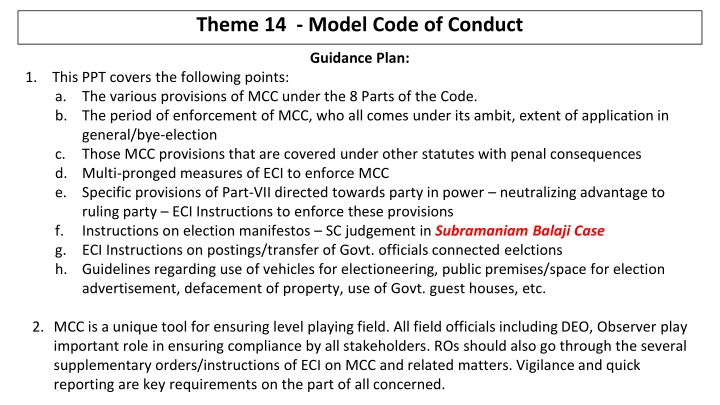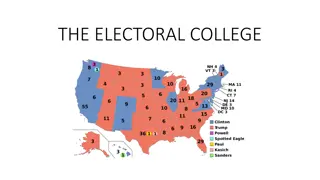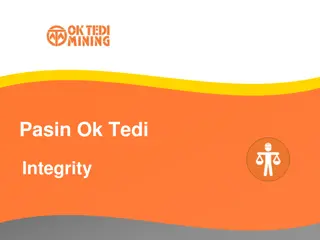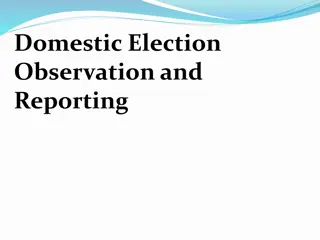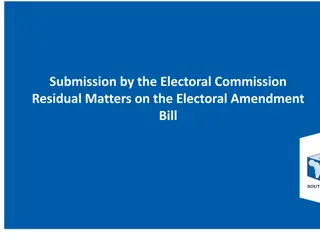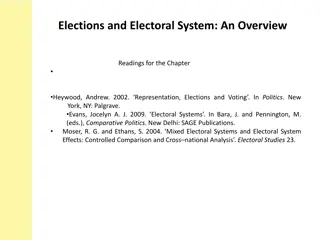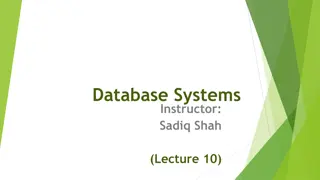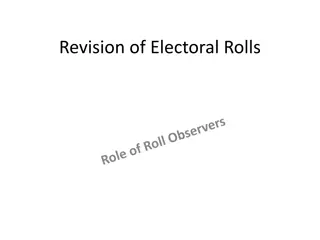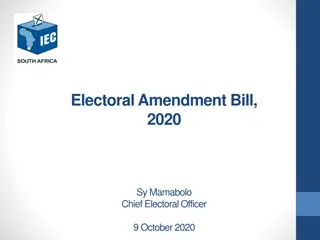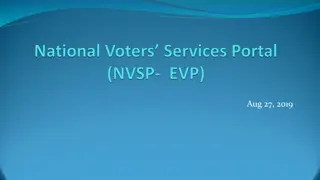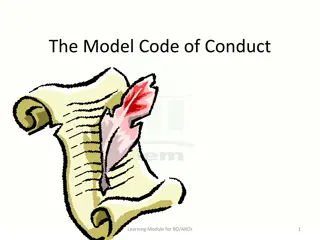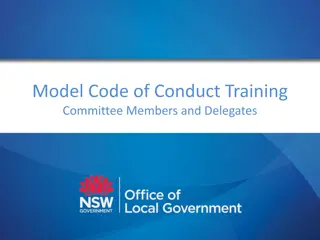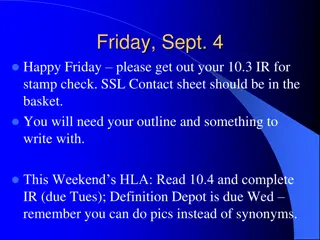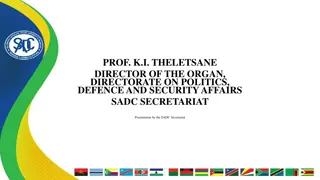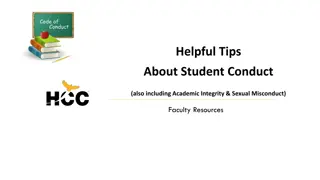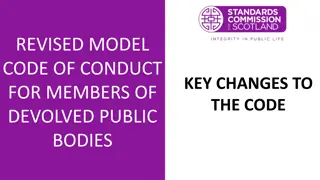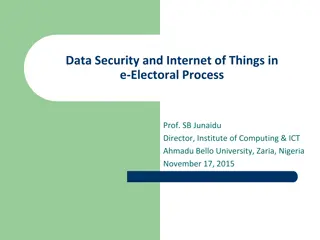Guidance on Ensuring Electoral Integrity through Model Code of Conduct
This presentation provides comprehensive guidance on the Model Code of Conduct (MCC) in elections, covering provisions, enforcement, applicability, penalties, ECI directives, party neutrality, election manifestos, government officials' roles, and more. Understanding and adhering to the MCC is crucial for maintaining a fair electoral process, and various stakeholders play key roles in upholding its principles.
Download Presentation

Please find below an Image/Link to download the presentation.
The content on the website is provided AS IS for your information and personal use only. It may not be sold, licensed, or shared on other websites without obtaining consent from the author.If you encounter any issues during the download, it is possible that the publisher has removed the file from their server.
You are allowed to download the files provided on this website for personal or commercial use, subject to the condition that they are used lawfully. All files are the property of their respective owners.
The content on the website is provided AS IS for your information and personal use only. It may not be sold, licensed, or shared on other websites without obtaining consent from the author.
E N D
Presentation Transcript
Theme 14 - Model Code of Conduct Guidance Plan: 1. This PPT covers the following points: a. The various provisions of MCC under the 8 Parts of the Code. b. The period of enforcement of MCC, who all comes under its ambit, extent of application in general/bye-election c. Those MCC provisions that are covered under other statutes with penal consequences d. Multi-pronged measures of ECI to enforce MCC e. Specific provisions of Part-VII directed towards party in power neutralizing advantage to ruling party ECI Instructions to enforce these provisions f. Instructions on election manifestos SC judgement in Subramaniam Balaji Case g. ECI Instructions on postings/transfer of Govt. officials connected eelctions h. Guidelines regarding use of vehicles for electioneering, public premises/space for election advertisement, defacement of property, use of Govt. guest houses, etc. 2. MCC is a unique tool for ensuring level playing field. All field officials including DEO, Observer play important role in ensuring compliance by all stakeholders. ROs should also go through the several supplementary orders/instructions of ECI on MCC and related matters. Vigilance and quick reporting are key requirements on the part of all concerned. 1
Key Provisions Part-I General Conduct: Criticism of political parties must be limited to their policies and programmes, past record and work. Following activities are prohibited: Using caste and communal feelings to secure votes, Criticizing candidates on the basis of unverified reports, Bribing or intimidation of voters, and Organizing demonstrations or picketing outside houses of persons to protest against their opinions. 2
Key Provisions Part-II Meetings: Parties must inform the local police authorities of the venue and time. Part-III Processions: If two or more candidates plan processions along the same route, organizers must establish contact in advance to ensure that the processions do not clash. Carrying and burning effigies representing members of other political parties is not allowed. 3
Key Provisions Part-IV Polling day: All authorized party workers at polling booths be given identity badges. Badge should not contain the party name, symbol or name of the candidate. Part-V Polling Booth- No one to be allowed to enter polling station without valid pass/authority letter from ECI. Part-VI Observers: Candidates or political parties may report violation of MCC to the Observer 4
Key Provisions Part-VII Party in power: Ministers must not combine official visits with election work or use official machinery for the same. Ruling party must avoid advertising at the cost of the public exchequer Ministers and other authorities must not announce any financial grants, or promise any construction of roads, provision of drinking water, etc. All parties/candidates should have equitable access to public spaces and rest houses and these must not be monopolized by the party in power. Ministers/other authorities (except civil servants) shall not lay foundation stones etc. of new projects/schemes 5
Key Provisions Part-VIII Election manifestos: Promise in election manifestos not a corrupt practice. Election manifestos shall not contain anything repugnant to ideals and principles of Constitution. Manifestos should reflect rationale for the promises and should indicate ways and means to meet financial requirement for it. 6
Period of enforcement Comes into operation with immediate effect on announcement of election schedule by ECI. Remains enforceable from date of announcement of election till completion of election process. Date of announcement of election program ordinarily should not be more than 3 weeks period anterior to date of notification, as per agreement reached between the Union Govt. and ECI on 16.04.2001. 7
Extent of application of MCC During general election to House of People- Entire country During general election to State Assembly- State concerned During bye-election District in which AC/PC going to bye-poll is situated. However, in metropolitan cities, State capitals and cities with Municipal Corporations, the MCC remains confined to the AC/PC concerned 8
Who are covered under MCC Political parties and candidates Ministries/Depts. Of Central/State Govts. All Organizations/Committees/Corporations/Commissions etc. funded wholly or partially by Central Government/State Government Contd 9
Who are covered under MCC contd. Election related campaign activities undertaken by persons other than political parties and candidates: Nobody should invoke, in any manner, religion or religious grounds in any manner Nobody should indulge in any activities or make any statements that would amount to attack on private life of any person When persons and organizations seek permission to hold public programs, they should be asked to give a declaration/undertaking. The public programs of such persons and organizations should be closely monitored through videography If the programs involve incurring expense and amounts to directly promoting the electoral prospects of any particular candidate or candidates, prior special authority from the candidate concerned for incurring the expense shall be obtained, in writing. 10
Legal status MCC is not enforceable by law. However, certain provisions of the MCC have corresponding provisions in statutes such as IPC 1860, CrPC 1973 and RPA 1951. The following malpractices mentioned in MCC are listed as corrupt practices and electoral offences in the IPC and the RPA, 1951:- Indulgence in any activity which may aggravate existing differences or create mutual hatred or cause tension between different castes and communities, religious or linguistic- a corrupt practice under S 123 (3A) RPA, 1951. Contd.. 11
Legal status MCC overlapping with RPA and other Statutes contd. Appeal to caste or communal feeling for securing votes and use of places of worship as forum for election propaganda- both a corrupt practice and an electoral offence under S 123 (3) and S 125 RPA ,1951, respectively. Bribery to voters- both a corrupt practice and an electoral offence under S 123 (1) of RPA, 1951 and Section 171B of IPC, respectively. Intimidation of voters- an electoral offence under S 135A (C) of RPA, 1951. Impersonation of voters- an electoral offence under S 171D of IPC. Canvassing within 100 meters of polling stations- an electoral offence under S 130 of RPA, 1951. Contd 12
Legal status contd. Holding of public meetings during the period of 48 hours ending with the hour fixed for the close of the poll - an electoral offence under S 126 (1) of RPA, 1951. Transport and conveyance of voters to and from polling stations - both a corrupt practice and an electoral offence under S 123 (5) and S 133 of RPA, 1951, respectively. Creating obstruction in or breaking up meetings and processions of one political party by workers of other parties OR creating disturbances at public meetings of one political party by workers or sympathizers of other political parties by putting questions orally or in writing or by distributing leaflets of their own party OR taking out processions by one party along places at which meetings are held by another party OR removing posters of one party by workers of another party is an electoral offence under S 127 of RPA, 1951. Serving or distributing liquor on polling day and during the forty eight hours preceding it- an electoral Contd offence under S 135 (c) of RPA, 1951. 13
Legal status contd. Any person/political party having a grievance in relation to any of above malpractices may take legal recourse under relevant laws mentioned above:- The general perception about MCC is that the code is self-regulatory and given to themselves by the political parties but the fact is that its violation attracts specific penal action. Further, ECI is empowered under para 16A of the Election Symbols (Reservation and Allotment) Order, 1968 either to suspend or withdraw the recognition of party after giving that party a reasonable opportunity to defend itself in the event of violation of Model Code of Conduct. 14
SUPREME COURT ON MCC The Apex Court has held that Article 324 of the Constitution gives plenary power to ECI. The Supreme Court has consistently held (in the cases - Mohinder Singh Gill Vs. Chief Election Commissioner (1978) 1 SCC 405:AIR 1978 SC 851), A.C. Jose Vs. Sivan Pillai and Ors (1984) 2 SCC 656) and Kanhiyalal Omar Vs. R.K. Trivedi and Ors (1985) 4 SCC 628: AIR 1986 SC 111) that the ECI has residuary power under the Constitution to act in appropriate manner in the matter of conduct of election where the enacted laws are silent or insufficient to deal with a given situation. In S. Subramaniam Balaji case, the Supreme Court held that the ECI, in order to ensure level playing field between the contesting parties and candidates in elections and also in order to see that the purity of election process does not get vitiated, has been issuing instructions under MCC. The fountainhead of the powers under which the ECI issues these orders is Article 324 of the Constitution. 15
Special Measures taken by ECI to enforce MCC Transfer/posting of election related officers. Advisory to Political parties and candidates and do s and don ts for electioneering to be followed by them. A clear cut protocol of communication between ECI and Union/State Government on Model Code: Model Code related direction shall be issued only by ECI. Cabinet Secretary or Committee of Cabinet shall coordinate references from various departments of Union Governments. Subordinate offices/PSUs to make references through their main Ministry. Contd 16
Special Measures taken by ECI to enforce MCC contd. Directions to State Governments: - Constitution of Screening Committee headed by CS and consisted of Secy./Principal Secy. of Co-ordination Department/General Admin. Department and Secy./Principal Secy. of the Department for sending the proposal for approval of the ECI. - CEO shall forward only such proposal which have been cleared by Screening Committee, with his specific comments. The concerned department shall not send the original file to CEO office but only a self-contained reference. CEO shall not send any reference to the ECI in cases where clear cut instructions exist to deal with. 17
MCC for Party in Power Visits- No minister will mix his official travelling with personal visit. No govt. official shall be called to attend any private meeting by the minister. The Ministers have been permitted to take one non-gazetted official to accompany them during their private visits to attend to urgent official work. The CEO shall be kept informed, in advance, of visits proposed to be undertaken by any minister(s) of the Central govt by the DEO. CEO shall communicate it to the Commission. 18
MCC for Party in Power Visits- No arrangements on private meetings by Government servant. Expenses on private meetings/journeys will be borne privately. No honors at any official function on special occasions. Ban on use of official vehicles/pilot car for campaigning. Meetings/Tours on emergent situations in Constituency allowed PM is exempted from above restrictions. 19
MCC for Party in Power No sanction of grant/payment out of discretionary fund. Announcement of new project/programme/financial grant which have effect of influencing the voters is prohibited. Following types of existing works can be continued without reference to the Commission. - Work projects already started on ground before MCC, after obtaining necessary sanction - Benefits to beneficiaries already identified by name, under schemes like MGNREGA etc. - Release of amount/remaining amount of the completed project Commission s prior approval needed for announcement of relief programmes. Emergency relief work can be taken. 20
MCC for Party in Power Administrative Matters- Regular recruitment/promotion through UPSC/SSC allowed. Regular promotions on the basis of DPCs permitted Prior clearance for recruitment through non-statutory bodies required. Publicity No hoarding/advertisement at the cost of public exchequer, though there is no objection to publication of photographs/messages related to departed leaders. 21
MCC for Party in Power The Govt. advertisements of various kinds including the ones on accomplishments and achievements on special occasions like Republic Day, Independence day, etc., shall be regulated as follows:- Advertisement of general nature in connection with specific occasions of importance may be published. However, such publishing shall be restricted to the dates coinciding with the special occasion only, and it shall not be published on other days. The advertisement shall not bear photographs of any Minister and other political functionaries. All references to Ministers, Politicians or Political Parties available on such State Government /Central Government s official websites, shall be taken off/ purged of. 22
MCC for Political Parties/Candidates in general Criticism of other parties/candidates shall be confined to policies/programmes/past record. No criticism of private life/unverified allegation No appeal to caste/communal feelings Corrupt practices like bribery, intimidation, impersonation, canvassing within 100 meters of polling stations, holding public meetings during the period of 48 hours, transport/conveyance of voters to and fro polling stations should be avoided No picketing/demonstration in front of houses of individuals No obstruction in meetings/processions organized by other parties. 23
MCC for Political Parties/Candidates in general use of vehicles contd. Each contesting candidates will be permitted only three vehicles on the poll day. No limit for own vehicles which a candidate may use for electioneering purpose though, he has to take permission and furnish details of all such vehicles to DEO, to enable expenditure observer to check expenditure. Vehicles deployed for election campaigning by candidate should not be requisitioned by district administration. Recognized political parties may be given permission for one vehicle per 25 ACs for distribution of publicity materials to their offices. 24
Star Campaigners If any star campaigner is issued notice for violation of MCC, notice will also be issued to political party concerned Political party is supposed to brief its star campaigner to ensure compliance of MCC Campaign of star campaigner is to be meticulously tracked by CEO/DEO/RO/Observer Any violation to be reported to the Commission immediately for follow up at the level of the Commission in order to give visibility to the action taken against star campaigner CEO/DEO/RO to maintain party wise register with details of MCC violation cases by star campaigners and action taken against them These details are to be put in public domain with special attention to media for deterrence for the candidates/political party against indulging in any violation 25
Election Manifestos SC maintained in Subrahmaniam Balaji that though election manifesto cannot be construed as corrupt practice under S 123 RPA 1951. The Supreme Court directed to the Commission to frame guidelines under MCC for election manifestos The Commission s guidelines are Election Manifestos shall not contain anything repugnant to principles and ideals of Constitution and to be consistent with letter and spirit of MCC Political party should avoid promises which are likely to vitiate the purity of the election process or exert undue influence on the voters. Trust of voters should be sought only on those promises which are possible to be fulfilled. Manifesto to reflect rationale for promises and broadly indicate ways and means to meet financial requirements Manifesto shall not be released during silence period 26
MCC on Government Officials Transfer/Posting Ban on transfer of officials involved in election work in any capacity without Commission s prior approval Officers not allowed to continue in present posting within the district (district here means revenue district and not election district or police district) (i) If she/he is posted in her/his home district; (ii) If she/he has completed three years in that district during last four years or would be completing 3 years on or before the last day of the month in which the tenure of the house is due to expire, for which general election is due. 27
MCC on Government Officials These instructions cover ROs/AROs and other officers viz. Deputy/Assistant Collectors, SDM, Tehsildars and BDOs. Even IAS/PCS who do not fall under ambit of district administration viz. officers posted in municipal or development authorities are covered under this policy. Officers appointed as Sector Officers, though directly involved in election duties will not be covered under these instructions as their duties are such that they are deployed in field duties where their knowledge of the area/terrain is crucial to their effective performance. 28
MCC on Government Officials As far as officer in the Police Department are concerned, these instructions shall be applicable to the Sub-Divisional Head of Police, Dy.SPs/Circle Officers, Inspectors, Sub- Inspectors or equivalent ranks posted in the field within the Assembly Constituency Limit. Police Sub-Inspectors if he is incharge of Thana, who have completed 3 years period should be transferred out to a police sub-division which does not fall in the same AC. If that is not possible due to small size of districts, then he should be posted out of the district. 29
MCC on Government Officials Categories of officers not covered under transfer policy- Officers posted in state headquarters of the department. Any officer who is due to retire within coming six months. No officer shall be associated with election related work if a criminal case is pending in any Court of Law or against whom Commission has recommended disciplinary action or who have been charged for any lapse in any election or election related work in past. Officers not directly connected with elections (like doctors, engineers, teachers etc.) Officers appointed as sector officer/zonal magistrates. DEO to collect declaration confirming transfer policy compliance 30
MCC on Government Officials - Meetings No meeting/video conferencing with Minister of Union/State Government. Only in event of natural calamity of significant scale, meeting/VCs are allowed with certain conditions such as Prior approval from CEO/Commission Only DM or senior officers to attend No issue other than the natural calamity to be discussed No publicity No media attention Proceedings to be recorded and copy of the same to be given to CEO Restriction on tour/station leave whose spouse are active in politics. 31
MCC on other Public Servants/Heads of Autonomous Bodies The Commission has directed that except in emergent situation, tours of members of the Commissions/Boards to a poll going state may be deferred In unavoidable situation, if visits to such state is necessary, CEO to be intimated The members are to ensure that no political activity such as meeting with politicians/ministers or holding public hearing etc. is undertaken Any proposal for appointment of members to be cleared from the Commission The Commission has taken serious view on various instances of MCC violation by such dignitaries 32
MCC on NGOs/Persons other than Political Parties/Candidates The Commission has been receiving complaints against various social, cultural or religious organizations about making appeals to electors amounting to election campaigns in favour of a particular candidate/political party by holding events The Commission has laid down following guidelines incase of such NGOs- Nobody should indulge in any activity to create disharmony among different classes Nobody should indulge in any activity/make any statement to attack private life of any person Prior permission to be taken to hold such public programmes District administration to closely monitor such public programme through videography Expenditure on such programmes to be monitored under S 171H IPC 1860 33
Use/Requisition of Vehicles MCC Plus Exemption from Requisition Vehicles being lawfully used by candidate/agent. Vehicles belonging to wildlife sanctuaries/national parks/BSNL/AIR/DD Vehicles of WHO/UNICEF/UNO Organs Ban on use of official vehicles by political functionaries- Official vehicle means all vehicles belonging to central government, state government, PSUs of central/state government, local bodies, marketing boards, operative societies, autonomous district council (in which public funds are invested) Ban on use of official vehicles will equally apply to vehicles of non-poll going states Only exceptions are PM and Leaders who require high security cover 34
Use/Requisition of Vehicles MCC Plus contd. Restriction does not apply in case of President and Vice-President Restrictions do not apply to Speaker/Deputy Speaker of Lok Sabha and Deputy Chairman of Rajya Sabha visiting during the LA Elections. For LS elections, the prohibition will apply to this category. Movement of convoys of not more than 5 vehicles, excluding security vehicles- Gap of half an hour between two convoys Maximum number of vehicles allowed during filling of nominations- 2 vehicles within periphery of 100 metres of RO office Use of vehicles for electioneering No limit on vehicles used by a candidate. He has to furnish the details of all vehicles Vehicles being used by recognized political party- DEO to issue permit for one vehicle to be used by district level office bearer For states having more than 100 ACs, CEO to issue permit of maximum of 5 vehicles for use of state level office bearers of recognized political party. In other states, maximum 3 vehicles to a recognized political party 35
Use/Requisition of Vehicles MCC Plus contd. For transporting publicity material CEO to grant permission for one vehicle for every 25 ACs to a recognized political party Use of Vehicles on Poll Day during LA election - One vehicle for candidate, one vehicle for election agent and one vehicle for other party workers. Bulletproof vehicle to leaders covered by Z+ security- Bulletproof vehicle may be allowed to such leaders with condition cost of propulsion of vehicle to be borne by person concerned - o If he is a star campaigner, expenditure to be borne by political party. o Use of spare multiple vehicle, if prescribed in such case, would be allowed at government cost. o No objection to personal staff/any other political functionary/candidate accompanying the SPG protectee in said vehicle. 36
Use of public property for electioneering MCC Plus Use of maidan/parks/playground on equitable basis Grounds of schools and colleges are permitted only in areas where alternative public grounds are not available and strictly subject to specific conditions as stipulated by ECI Instruction (?) Use of space in public properties for wall writing, displaying election material/banners/ flags/hoardings prohibited State transport buses/government owned vehicles shall not be used for political advertisement 37
Party flags / banners at private residence/vehicle MCC Plus Maximum 3 flags of a party/candidate can be displayed. If someone wants to display flags of more than one party or candidate, it should be restricted to only one flag of each party/candidate On vehicles, one flag of maximum size of 1 ft. X ft. with a pole/stick of not more than 3 ft., allowed No banner allowed on any vehicle. During roadshow, a banner of maximum size of 6 ft. X 4 ft. allowed to be carried in hand. 1 or 2 small stickers of appropriate size permitted on a vehicle. No spot focus /flashing/search light /hooter allowed on a vehicle. 38
Defacement of private property/vehicles MCC Plus Flags/banners in private premises with voluntary permission of the occupant. Where specific state /local law exists, provisions of the same will be applied. On private vehicle, flags and stickers can be put by owner in the manner, they do not cause any inconvenience to other road users. On commercial vehicles, display of election material not permitted, unless vehicle is validly being used for election campaign. Timeline for removal of unauthorized defacement- From government property within 24 hours from announcement of election. From public place within 48 hours. From private property within 72 hours. 39
Use of government guest house - MCC Plus Not permitted for political leaders, while campaigning except those covered by security In such case not more than 3 vehicles be permitted inside the compound 40
Temporary campaign office of political parties/candidates MCC Plus Not to be setup in an encroached property. Not to be opened in a religious place. Not to be in a place contiguous to any hospital/educational institution Not to be within 200 meters of an existing polling station Only one party flag/banner with party symbol/photograph to be displayed at such office Size of banner shall not exceed 4 ft X 8 ft subject to condition of local laws. Expenditure observer to monitor and book expenditure in the account of candidate. 41
Other restrictions MCC Plus Restriction of use of animals for election campaigning. Restriction on use of photographs of defense forces/personnel. Restriction on engagement of child labour in election related activities. Restriction on use of plastic/polythene during electioneering. 42
